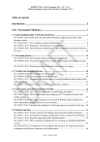 This paper is made public just before the adoption process of the work programme to provide potential participants with the currently expected main lines of the work programme 2016-2017. It is a working document not yet endorsed by the Commission and its content does not in any way prejudge the final decision of the Commission.
This paper is made public just before the adoption process of the work programme to provide potential participants with the currently expected main lines of the work programme 2016-2017. It is a working document not yet endorsed by the Commission and its content does not in any way prejudge the final decision of the Commission.
The adoption and the publication of the work programme by the Commission are expected in mid-October 2015. Only the adopted work programme will have legal value.
This adoption will be announced on the Horizon 2020 web site and on the Participant Portal. Information and topic descriptions indicated in this working document may not appear in the final work programme; and likewise, new elements may be introduced at a later stage. Any information disclosed by any other party shall not be construed as having been endorsed by or affiliated to the Commission.
The Commission expressly disclaims liability for any future changes of the content of this document.
Download: Draft Horizon 2020 Work Programme 2016-2017 in the Area of "Health, Demographic Change and Well-being" (.pdf, 1.140 KB).
Download from eHealthNews.eu: Draft Horizon 2020 Work Programme 2016-2017 in the Area of "Health, Demographic Change and Well-being" (.pdf, 1.140 KB).